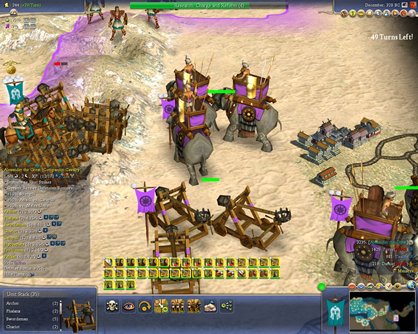CIVilized conversation with Soren Johnson
We talk with the creative force behind Civilization IV about the past and future of PC games
You’ve done a lot of work on AI in your games. We think it’s a topic which gamers tend to misunderstand, ourselves included.
Soren: I think when talking about games in general, it’s important to differentiate between when you’re talking about an abstraction game or a real world game. Because the two get mixed up a lot. When you’re talking about a real world game where you’re moving around some kind of environment, you have an expectation that things will function. Straight human behavior stuff. You can get a long way with convincing animations and having the guys say smart things at the right time, but for the most part, these are all deeply asymmetrical games (i.e. games where the AI isn’t bound by the same rules as you - Ed).
This is why no one is interested in playing symmetrical shooters that aren’t multiplayer. But when you’re talking about these real world games, if it’s an asymmetrical situation... the issue with AI isn’t one of challenge. It’s one of: do they act like people? Do they run away if they’re scared? Do they get stuck on things?

But it’s different for a game like Civ, yes?
Soren: If you leave the real stuff behind and go into abstraction, then it’s a totally different ball game. What I’ve worked on has always been these symmetrical strategy games. To me, the interesting thing there isn’t so much the AI questions, but the game design questions. When you’re making a multiplayer game, when you make a design choice, all you have to worry about is whether it’s a feature humans will have fun with... But a game like Civ is multi- and single-player. You ask whether the feature is fun, but also whether it’s something the AI is ever going to understand. Because if it’s hopeless at it, it’s pretty useless.
Finally, what attracted you to Maxis and Spore?
Soren: Spore is a hugely important project. It’s really at the forefront at a lot of progressive ideas about game. Just being smart about connectivity - just because a game isn’t MP, doesn’t mean that you can’t do cool things to connect people in the game. Letting computers do what they’re good at - that is, procedural generation. This is something that, in many ways, the games industry is heading down the wrong path and trying to do things with brute force. Almost any game I work on, I want to have a significant dynamic element where we’re using simple rules to create a great deal of variety. Spore obviously is pushing that a great deal. And, of course, it’s really cool to work with Will Wright and the team.
Weekly digests, tales from the communities you love, and more
Feb 21, 2008


